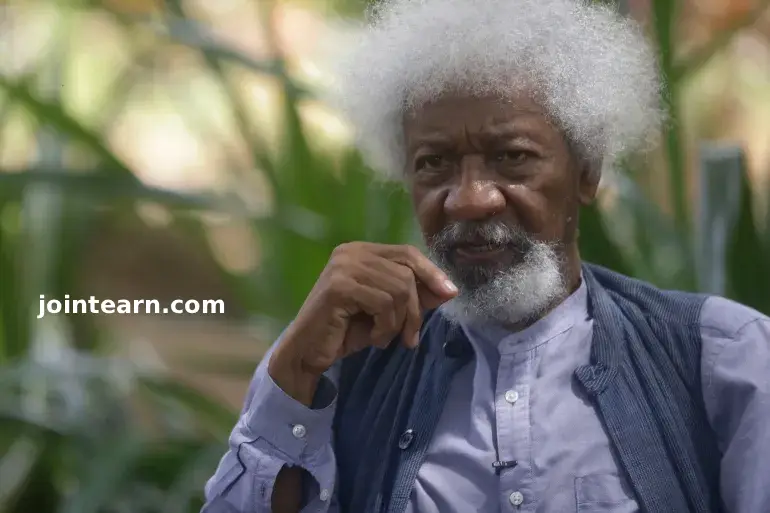
Lagos, Nigeria — October 28, 2025: The United States government has revoked the visa of Wole Soyinka, Nigeria’s celebrated playwright, poet, and the first African to win the Nobel Prize in Literature. The decision, issued under President Donald Trump’s administration, has ignited global criticism over what observers call a growing pattern of silencing prominent intellectuals and dissidents.
Speaking at Kongi’s Harvest Gallery in Lagos, Soyinka read aloud the official notice he received from the US Consulate in Lagos on October 23. The letter requested that he appear in person to “bring [his] visa for physical cancellation,” an order he met with his trademark wit.
“I like people who have a sense of humour,” Soyinka told an amused audience. “This is one of the most humorous letters I have ever received. Perhaps someone can go to the consulate on my behalf — I’m a little busy.”
A Literary Icon Targeted
Soyinka, 91, remains one of Africa’s most influential voices. His works — including Death and the King’s Horseman, The Man Died, and Chronicles from the Land of the Happiest People on Earth — have earned him international acclaim for their fearless engagement with politics, corruption, and tyranny.
But Soyinka has also been a long-standing critic of authoritarianism, including that of Donald Trump. In 2017, he famously destroyed his US green card to protest Trump’s election, declaring that he “would not belong to a society governed by such values.”
Now, with the revocation of his visa, Soyinka has become one of the latest victims of what human rights observers describe as an ideological purge of outspoken figures by the Trump administration.
“I am very content with the revocation of my visa,” Soyinka said with irony. “Maybe it’s time to write a play about Donald Trump himself.”
A Pattern of Retaliation Against Nobel Laureates
Soyinka’s case follows similar visa cancellations targeting globally recognized figures. Earlier this year, Oscar Arias, former president of Costa Rica and recipient of the 1987 Nobel Peace Prize, revealed that his US visa had been revoked — reportedly over his diplomatic ties to China and his public criticism of Trump.
Arias, who once brokered peace accords in Central America, told NPR that he suspected the decision was politically motivated. “The president has a personality that is not open to criticism or disagreement,” he said.
Analysts note that both Soyinka and Arias share reputations for intellectual independence and defiance of power — traits that appear increasingly unwelcome in Washington’s current political climate.
Trump’s Immigration Crackdown and ‘Hostile Attitudes’
Since returning to the White House in January 2025, President Trump has reinstated aggressive immigration policies reminiscent of his first term. A June presidential proclamation called for the denial or revocation of visas from individuals exhibiting “hostile attitudes toward the United States’ citizens, culture, or founding principles.”
Critics say the ambiguous language allows for arbitrary targeting of dissenting voices under the guise of national security. Civil society groups argue the policy directly undermines the US’s global reputation as a defender of free expression.
“Wole Soyinka has spent his life fighting censorship,” said Kehinde Bamgbose, a spokesperson for Nigeria’s PEN Centre. “For the US to cancel his visa — a country that claims to champion free speech — is deeply hypocritical.”
The Economists for Peace and Security, a United Nations–accredited think tank, similarly condemned the pattern of visa revocations, saying it “raises serious concerns about the treatment of globally respected figures who have dedicated their lives to peace and democracy.”
Soyinka’s Enduring Legacy
Despite the revocation, Soyinka struck a tone of levity and defiance. “A government that cancels a visa does not cancel a writer’s voice,” he remarked during his Lagos appearance. “Ideas are borderless.”
He also reiterated his deep personal connections to the United States, where he has held teaching appointments at Harvard, Yale, and Emory University. “I have always enjoyed cordial relations with Americans and with the consulate staff here,” he said. “This is not about them — it’s about politics.”
Soyinka’s career has long been marked by confrontation with authority. In the 1960s, he was imprisoned for nearly two years by Nigeria’s military regime for speaking out against the civil war. Yet even in solitary confinement, he continued to write — reportedly using scraps of toilet paper to record his thoughts.
That indomitable spirit, his supporters say, is precisely why his voice remains powerful today.
Global Outrage and Cultural Implications
Writers, activists, and academics across the world have condemned Washington’s actions, calling the visa revocation a form of political censorship. PEN America, the literary freedom organization where Soyinka once lectured, described the decision as “an assault on intellectual liberty.”
“Silencing writers like Wole Soyinka is an attack on the conscience of humanity,” said Suzanne Nossel, PEN’s CEO. “When governments fear words, they expose their own fragility.”
The move also sends a chilling message to international scholars, artists, and students whose US visas could now be subject to political review.
“Revoking one visa will not secure a nation,” Soyinka told his audience. “Governments that fear criticism only confirm their insecurity.”


Leave a Reply